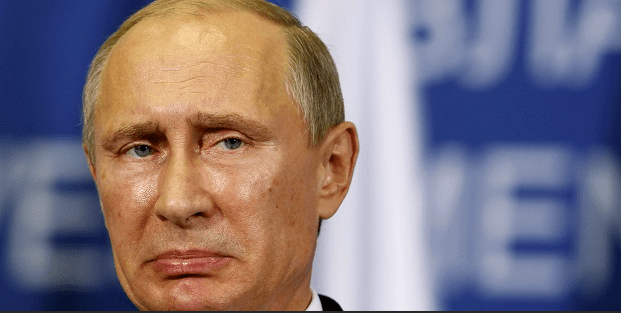Nice Pitch, Putin: If a Guy Tells You Happiness is Just a Mirage, Believe Him the First Time
In our current clash of the world orders, there’s something to be said for truth in advertising

Euromaidan Press
Lisa Van Dusen
June 20, 2021
Among the stock headlines that get dusted off for summits, labour negotiations and criminal investigations is the “no breakthrough” headline.
In labour negotiations and criminal investigations, the “no breakthrough” headline generally reflects the lack of a breakthrough. In diplomacy, the “no breakthrough” headline drives diplomats to distraction because so much of diplomacy happens between breakthroughs.
For last week’s meeting of President Joe Biden and President Vladimir Putin, for instance, the only breakthrough seriously anticipated in Geneva was that the President of the United States would not have to be decoupled from the leg of the President of Russia by a blast from the nearest garden hose. Or, as then-National Security Council Russia Advisor Fiona Hill said about the 2018 Helsinki bilateral, “My initial thought was just ‘How can I end this?’ I literally did have in my mind the idea of faking some kind of medical emergency and throwing myself backwards with a loud, blood-curdling scream into the media.”
During the world’s last major geopolitical realignment, four years elapsed between Ronald Reagan’s 1985 meeting with Mikhail Gorbachev in Reykjavik and the fall of the Berlin Wall in 1989. Reagan’s famous, “Mr. Gorbachev, tear down this wall” speech at the Brandenburg Gate was delivered halfway through that diplomatic marathon, on June 12, 1987. The literal breakthrough in that process — completed with sledgehammers, jackhammers and an orgy of masonry hoarding and boozy revelry — happened on November 9, 1989.
Who could have predicted then that the exhaustive public-private, consecutive interpretation-dilated process that mothballed the Soviet Union and brought freedom and democracy to Russia and Eastern Europe would one day be wistfully recalled as a simpler time.
The transformative potential of America’s unipolar moment, widely seen as squandered by strategic miscalculations on Russia’s political and economic transition during the 1990s, was followed by the seismic upheaval of the fourth industrial revolution which, by Y2K, was already proving its disruptive applications.
In the 2000s, the post-9/11 war on terror that preoccupied America’s security focus, vastly expanded the intelligence community and introduced unprecedented, internet-enabled surveillance innovations, coincided with the ascension of Putin, a KGB intelligence officer, to the Russian presidency. The certainties about the future of democracy that had inspired all that revelry in Berlin gradually appeared less certain on both continents and elsewhere as China’s rising economic influence shifted more countries into the “illiberal” column.
If human beings truly, suddenly hankered for authoritarianism, their votes wouldn’t have to be suppressed and nullified by its terribly short-sighted local surrogates.
What we have now is not a Cold War but a covert one whereby the siege of democracy is borderless and frequently waged by proxies of the geopolitical, political and other parties grubstaking this lunacy. That Joe Biden feels compelled to characterize this war as a competition between democracy and autocracy rather than the orchestrated elevation of one at the expense of the other by interests with existential stakes in the outcome says more about the success of covert corruption and digital disinformation than it does about the competitive advantages of either system. If human beings truly, suddenly hankered for authoritarianism, their votes wouldn’t have to be suppressed and nullified by its terribly short-sighted local surrogates.
One of the more assiduously fed fictions of the post-Trump content battleground has characterized the persistence of anti-democracy skulduggery — from GOP attacks on voting rights across a swathe of states to the deluge of death threats against election officials to the tactical intractability of Congress — as “Trumpian” in nature. Attributing a concerted assault on American democracy from within to the cultish thrall of a former game show host whose blog was shut down after a month due to — as the Washington Post put it — “measly readership”, seems a stretch, even for the peddlers of post-truthisms. But it is weirdly heartening to know that the propaganda front where headlines are artillery in a post-partisan war between pro- and anti-democracy forces, and where every development is framed accordingly, still values public credulity just enough to require a rationale, even a preposterous one.
Within the space of a week in June, Joe Biden re-established the United States on the world stage as a sane, responsible, competent leader of the rules-based international order, from the Cornwall G7 to the Brussels NATO summit to the meeting with Putin. The breakthrough in Geneva, aside from the agreement to resume nuclear negotiations and re-normalize diplomatic relations, was that the conversation was had and that it actually made sense.
In these complicated times, the domestic fight for democracy entails protecting the integrity of the system against both political corruption and industrialized misrepresentation. If this were an authentic, straightforward, overt competition between freedom, truth, agency, political and economic self-determination, privacy and mobility on the one hand and surveillance-state oppression on the other, the battle for hearts and minds would be, as it was in 1989, a no-brainer.
The Tolstoy quote “There is no happiness in life, only a mirage of it on the horizon,” dropped by Putin after the Geneva meeting in gloomy contrast to Biden’s humanist optimism, is no “Workers of the world, unite!” Refreshingly enough, it is an accurate depiction of a worldview that has already adversely impacted so many lives and that nobody, but nobody, would ever vote for. Spasiba, comrade.
Lisa Van Dusen is associate editor of Policy Magazine. She was Washington columnist for the Ottawa Citizen and Sun Media, international writer for Peter Jennings at ABC News, and an editor at AP National in New York and UPI in Washington.
